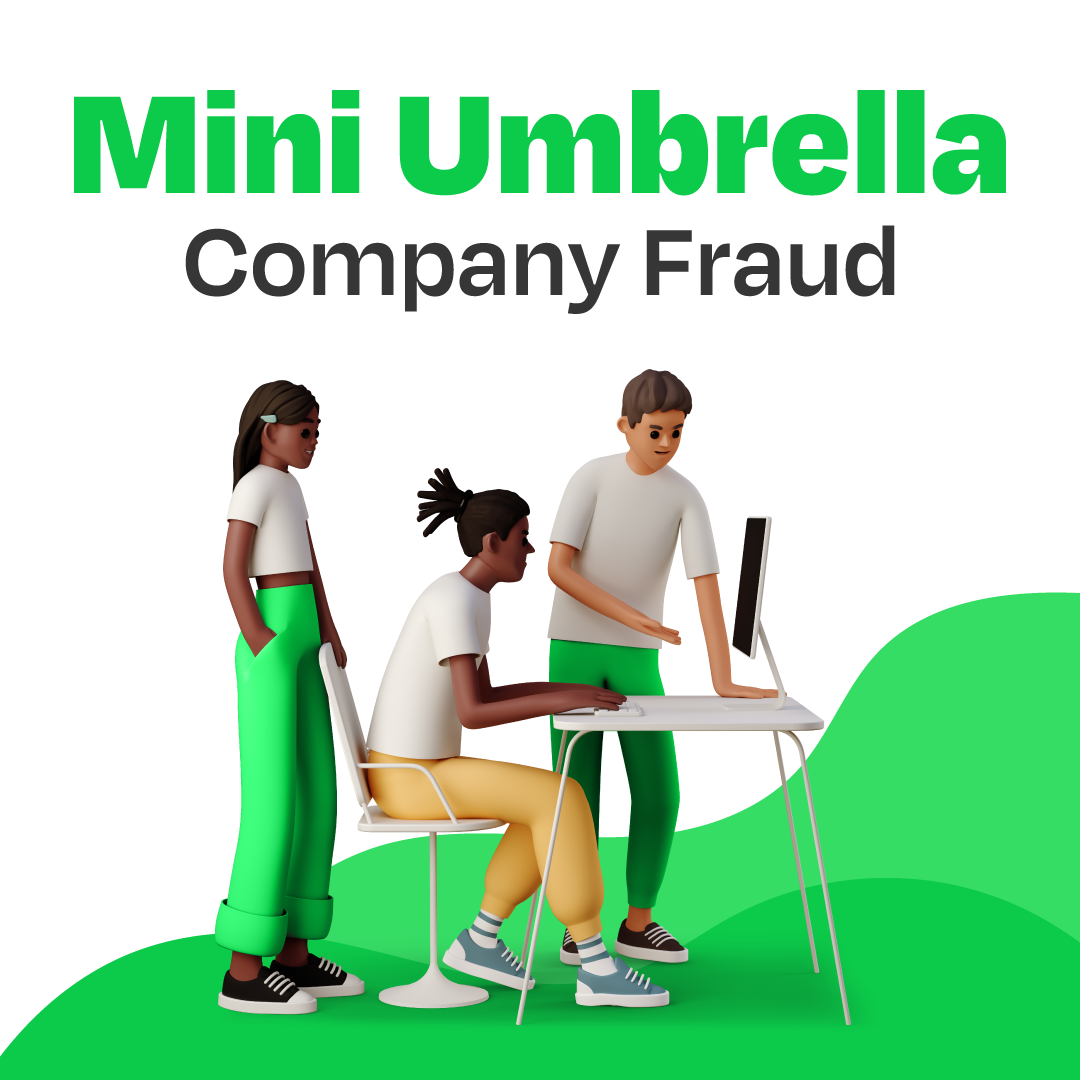HMRC action on Mini Umbrella Company Fraud
Over the last few years, the emergence of Mini Umbrella Company (MUC) fraud has cast a shadow over legitimate business practices within the umbrella company market. Along with other compliant businesses in the industry, we have done our best to increase awareness about this deceptive and dangerous practice.
A recent update from leading tax advisory firm BDO reveals that the problem of MUC fraud has not gone away, and that HMRC continues to clamp down in a bid to eradicate it.
What is MUC Fraud?
The term itself, Mini Umbrella Company, sounds fairly innocent; but don’t be fooled, it is a deliberate scheme designed to defraud HMRC while flying under the radar of unsuspecting agencies, hirers and contractors within the temporary labour supply chain.
In a legitimate umbrella company arrangement, temporary workers are employed by a single umbrella company, which then recovers the costs from the recruitment agency or client.
Conversely, fraudulent operators use a series of “mini umbrella” companies, each employing a small number of employees, in order to evade tax. They do this by taking advantage of the Employment Allowance (EA) and VAT Flat Rate Scheme (FRS) incentives, resulting in the non-payment of PAYE, National Insurance Contributions and other taxes, putting unwitting parties in the supply chain at risk.
The extent of this fraud is that thousands of mini umbrella companies have been incorporated for the express purpose of evading the correct levels of tax due. These companies employ only the minimum number of workers necessary for achieving the lowest possible tax liability.
Sometimes these arrangements may also involve underpaying workers while invoicing the agency for the full amount, invoicing the agency for fictitious expenses or failing to pay workers at all.
HMRC has responded by de-registering tens of thousands of mini umbrella companies and is actively using both civil and criminal powers to prosecute those responsible.
Latest cases brought by HMRC
Speaking at April’s FCSA members’ meeting In Manchester, BDO Employment Tax Principal Nick Duffin highlighted the most recent cases of MUC Fraud being robustly acted upon by HMRC. These demonstrate how the operators tried to use the FRS and EA incentives to evade tax, as described above. HMRC were having none of it!
Ezy Solutions Ltd. and Milo Corporation
- Payroll and labour providers who were supplying temporary workers to recruitment agencies.
- Workers were employees of mini umbrella companies (MUCs).
- Ezy would purchase labour from Milo who would purchase workers from around 1000 MUCs, who then purchased that labour from a network of 8000 MUCs.
- There were 6 entities between the end user and the worker.
- Milo registered for the VAT Flat Rate Scheme at 8% by claiming to trade as wholesalers.
- HMRC says the supply chain is not commercially feasible, and that Milo abused the FRS.
Elphystic Ltd.
- The First-Tier Tribunal (FTT) opened a lead case procedure against Elphystic and four other MUCs.
- HMRC says that the lead appellants were part of an organised structure with the purpose of defrauding the revenue by claiming the Employment Allowance and registering for the VAT Flat Rate Scheme.
- The FTT concluded the arrangements in place meant the MUCs should not have been permitted to account for VAT under the FRS or claim the EA.
Staying vigilant
The following may be signs of MUC fraud, many of which can be gleaned from a simple Companies House search,
- The company being recently created (check incorporation date) – mini umbrella umbrella companies often have a short life span.
- Unusual company name – multiple mini umbrella companies may be set up at the same time with variations of the same name.
- Unusually high turnover of workers – workers may frequently be moved between mini umbrella companies, to create confusion and deceive HMRC. In some instances the contractor may not know exactly what entity is paying them.
- Unrelated business activity description – where the business description in Companies House does not match the services provided.
- Foreign directors – many directors of mini umbrella companies are resident abroad which makes it even more difficult to identify, shut down and penalise.
While HMRC continues in its efforts to tackle the operators of mini umbrella companies, they remain a present threat. It is crucial for businesses and contractors to stay vigilant about who they are dealing with at all times to avoid being drawn into any form of tax evasion, however unknowingly.
This is especially relevant for recruitment agencies, further to the government’s recent announcement that it will be legislating for mandatory due diligence for businesses using umbrella companies to pay their contingent workforces.
Liquid Friday COO Joe Taffurelli urged agencies to stay mindful of the risks:
“Mini-umbrella company fraud isn’t just a shortcut—it’s a slippery slope to legal peril. By facilitating tax evasion, businesses and their directors risk more than financial loss; they gamble their reputations and freedom. Don’t be lured by promises of easy gains; they’re veiled invitations to criminal liability. Choose transparency over temptation, honesty over evasion. Remember, the cost of complicity far outweighs any fleeting benefits. Let’s build businesses on the bedrock of ethics, not on the shifting sands of deception. Stand tall, stand lawful, and let honesty be your guiding umbrella in the storm of temptation.”
The FCSA has recently launched its Diligence Hub, an innovative platform designed to manage the due diligence and compliance requirements between recruiters and umbrella companies.
The best advice is to stick with umbrella companies that are FCSA accredited and have an established and trusted reputation within the industry.
Further reading
Mini Umbrella Company Fraud – don’t get dragged through the MUC
Mini Umbrella Companies = Tax Fraud




